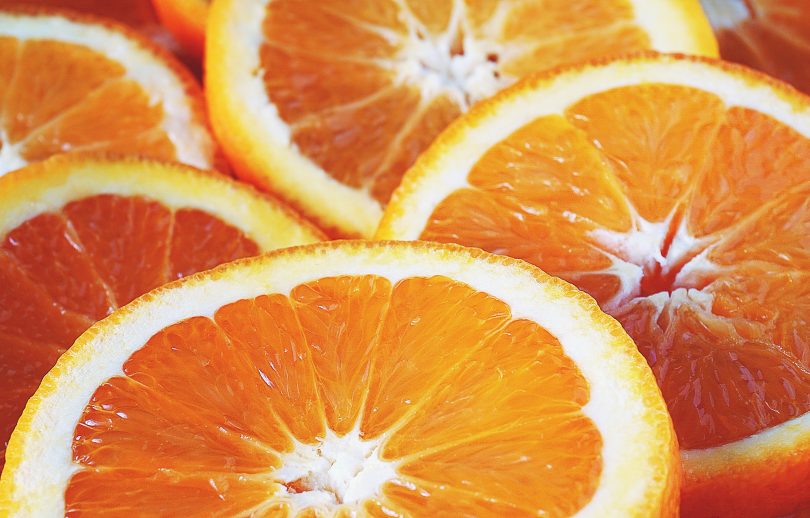Valencene is a sesquiterpene that is found in a variety of plants, including cannabis. It gets its name from Valencia oranges, which are a widely-used source of this highly aromatic terpene. Its aroma makes it of much interest as an additive for flavoring and scents in a variety of different industries. Additionally, valencene has been shown to have medicinal properties against certain diseases.
Valencene can be isolated through extraction or fermentation. However, copious amounts of plant material (orange peel) are needed when using extraction. It takes about two truckloads of oranges to extract a liter. For this reason, companies have been developing fermentation processes that require much less source material.
Medicinal Benefits of Valencene
One condition that valencene may be useful for treating is atopic dermatitis. [1] Atopic dermatitis is a chronic relapsing inflammatory skin condition. It causes the skin to dry out and produces lesions and extreme itchiness, which leads to scratching and an exacerbation of the lesions.
Researchers isolated valencene from Cyperus rotundus (purple nutsedge) and applied it topically to mice. The result was a reduction of the characteristic symptoms found with atopic dermatitis due to anti-inflammatory effects. [1]
Valencene has also been implicated as a cancer-fighting substance. When oxidized, the sesquiterpene produces nootkatone, a derivative that has been shown to help inhibit the proliferation of lung cancer cells in vivo. [2] Nootkatone is also used in insect repellents, as it has been shown to deter and kill ticks and mosquitos.
Sources of Valencene
In addition to Valencia oranges, a wide variety of plants contain valencene. Blood, navel and sweet oranges contain the sesquiterpene as do various types of oregano, including Russian, European and Algerian. It can also be found in American beauty-berry, French mulberry and in various types of mandarins.
In cannabis, it produces a highly citric pleasant aroma. Cultivars reported to have significant quantities of valencene include Tangie, Agent Orange, ACDC, Mother of Dragons, and Rainbow.
Image Source: Suzy Hazelwood from Pexels
References:
- Yang JI, et al. Inhibitory effect of valencene on the development of atopic dermatitis-like skin lesions in NC/Nga mice. Evidence-Based Complementary and Alternative Medicine. 2016;2016(9370893). [Impact Factor: 2.064; Times Cited: 131 (Semantic Scholar)]
- Manh Hung LV, et al. Nootkatone, an AMPK activator derived from grapefruit, inhibits KRAS downstream pathway and sensitizes non-small-cell lung cancer A549 cells to Adriamycin. Phytomedicine. 2019;63(153000). [Impact Factor: 4.18; Times Cited: 2 (Research Gate)]








